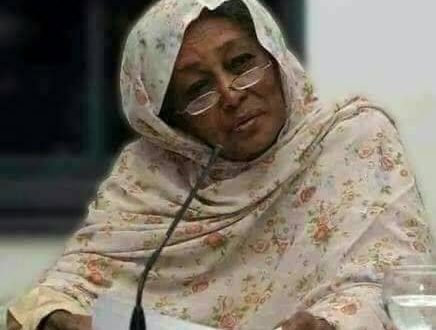The Communist Party of Israel (CPI) mourns the passing of the veteran Sudanese communist and feminist leader, Fatima Ahmed Ibrahim, who died at the age of 84 in London on Saturday morning, August 12. The Central Committee of the CPI sent a letter of condolences to the Sudanese Communist Party (SCP) leadership. In addition, the Democratic Movement of Women in Israel (Tandi) published an open letter following the announcement of the Ibrahim’s death.
The late veteran Sudanese communist and feminist leader Fatima Ahmed Ibrahim(Photo: Al Ittihad)
In Khartoum, upon hearing the news of her death, hundreds of mourners flocked to her home in the capital’s twin city of Omdurman, and the opposition SCP leadership met to decide on arrangements for flying Ibrahim’s body from Britain. Several political parties and armed movements have expressed their mourning for the late Communist leader, pointing to her long struggle for women’s rights and democracy.
Ibrahim was born in Khartoum in 1933. Her grandfather was one of the first headmasters in the colonial Sudanese education system, and her mother attended formal schools under the British authorities. Ibrahim founded the Union of Sudanese Women in 1952 and joined the Sudanese Communist Party in the mid-50s. She was a vocal opponent of the then military regime of General Ibrahim Abud who ruled Sudan from 1958 to 1964. Following the collapse of the Abud regime, she was elected as a member to parliament in 1965. In 1969, Fatima married Al-Shafei Ahmed al-Sheikh, who was then one of the country’s prominent trade unionists. In 1971, her husband was arrested and subsequently executed by Numiri’s regime over an alleged coup plot.
Fatima was held under house arrest for two and half years and for the next two decades remained a target of subsequent authoritarian governments. In 1990, she fled Sudan into exile in the UK where she continued with her human rights efforts. In 1991, Ibrahim was elected President of the Women’s International Democratic Federation. She won a UN award in 1993 for her human rights campaigns. She returned to Sudan 2005, the year after which she won the Ibn Rushd Prize for her struggle for women’s rights and social justice in Sudan and the greater Arab world.
Ibrahim authored two books – Our Path to Emancipation and Our Harvest in Twenty Years. During a party meeting held by the Sudanese Women’s Union in March 2007 and attended by prominent leaders of the Sudanese women’s movement within the Communist Party, she announced her retirement from the party’s Central Committee and all leadership positions as well as from the chairpersonship of the Women’s Union and as a representative in parliament. She said she believed in giving young people the opportunity to lead the federation in the coming phase. “Now is the time to hand over the banner to the youth,” she said. Ibrahim said she would become an ordinary member of the party and would accept no leadership positions.
August 16, 2017 in Political affairs. Tags: CPI-International Relations, socialism
 Laa-Laa لا لا موقع شباب السودان الحر
Laa-Laa لا لا موقع شباب السودان الحر












